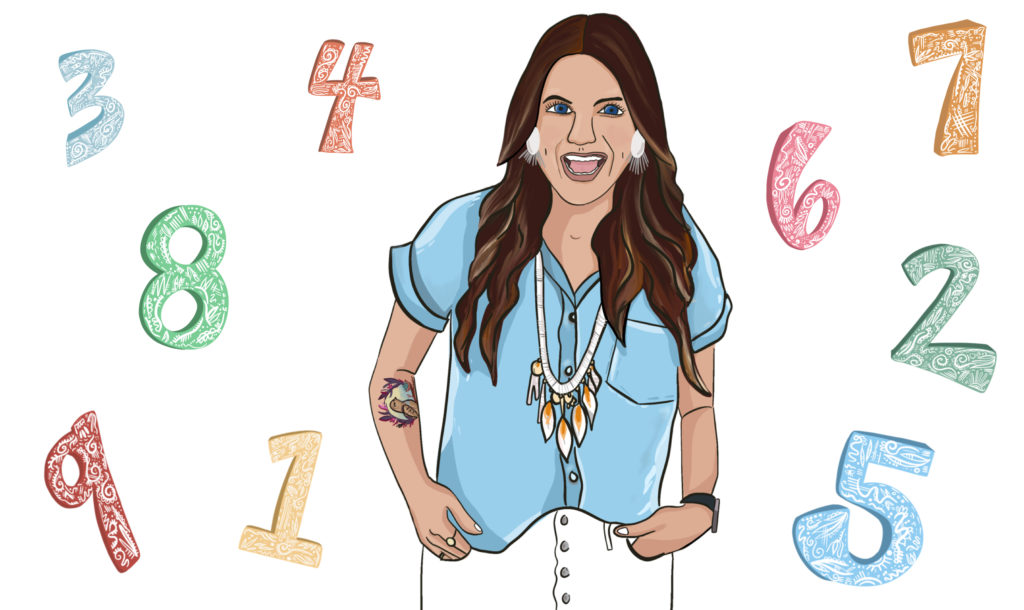Austin Woman chatted with local author and podcaster Jamie Ivey about the latest personality-test craze, the Enneagram.
By Courtney Runn, Illustrations by Madison Weakley

Myers-Briggs is out; the Enneagram is in. The latest trend in personality tests, the Enneagram divides people into nine categories, with each corresponding number correlating with a driving, core motivation. Each number has a basic fear (being unwanted, being useless, etc.), a basic desire (to protect oneself, to have inner stability, etc.) and a key motivation. Dating back to antiquity, with the modern iteration developed in the 1970s, it’s experienced a revival in the past few years. While there are both free and paid tests available online to help you determine your number, many Enneagram experts suggest studying the numbers instead to see what resonates most. (The Enneagram Institute provides free, thorough descriptions of each number online.)
Jamie Ivey, a local podcaster and author, often talks about the Enneagram on her show, even interviewing leading Enneagram expert Suzanne Stabile during an August episode last year. While some might dismiss it as a fad, Ivey argues regardless of its longevity, the Enneagram is a helpful tool for understanding the best and most difficult parts of yourself. As a 6, known as The Loyalist, one of her basic motivations in life is fear. We asked her to share her journey with the Enneagram and how it’s helped her accept her personality and overcome fear in everyday life.
Austin Woman: How did you discover the Enneagram?
Jamie Ivey: I have my podcast, The Happy Hour, and I would interview people and they would always ask me, “What’s your number?” and then I did a book tour in 2018 and every question was, “What’s your Enneagram number?” and finally, I was like, “I have got to figure this thing out.” [My husband] and I went on a little getaway and while we were there, we both took the test and both read the book by Ian Morgan Cron and Suzanne Stabile, The Road Back to You.
AW: Why do you think personality tests are so popular? People were obsessed with Myers-Briggs and now the Enneagram seems to be having a moment.
JI: Deep down in all our cores, we desire to be known. So, I think that’s just in every human being. I feel more known in my relationship with my husband after figuring this out.
AW: A lot of people have a hard time accepting their number since it tends to highlight the negative aspects of personalities. What was your reaction to finding out you’re a 6?
JI: I first wanted to be a 3. I really wanted to be a 3 because in my mind, 3s are people who get things done and they make things happen. One of the things Suzanne taught me is that when I’m in stress, what I would go to would be a 3 because sometimes I can take on 3 qualities and look like a 3, but deep down, what drives me is a 6. Once I realized that, a lot of light bulbs went off and I went, “This is why I am the way I am. This is why I do things I do.”
AW: How has learning about the Enneagram changed your relationship with yourself and others?
JI: [The Enneagram has] helped me see that there’s nothing wrong with me. I’m not this weird person who constantly thinks of worst-case scenarios. But it’s helped me honestly see that this is a part of my personality. I’m not then going to go, “Oh, I get a pass [and]I get to always be anxious,” because I don’t think that’s what the Enneagram is for at all. I think it’s to say, “Hey, this is a part of my personality and now that I know this, for me personally, even as a Christian, I don’t want to live in fear.” I don’t want to always be fearful. It’s helped me say I know this is part of my personality, so how are we going to fight this today and not sit in it? It helped my marriage, my parenting.
AW: How can the Enneagram get misused?
JI: In a job situation, you can always say, “Oh, this is just how I am. I can’t be positive about this because I’m a 6.” Or a 1 could say, “I’m just a perfectionist, so you’re not doing it right, so you’re fired.” We can take those [so-called] negative aspects about ourselves and then stand on them, like, “This is who I am,” instead of putting the work in.
AW: How do you practice self-care as a 6?
JI: One thing that’s been helpful for me is letting go of everything and going out on a walk because I feel like there, I can just be alone; I can really be with my thoughts. I can see them from a different world. Now my husband knows. … I’ll come to him and say, “I don’t need you to fix anything. And I don’t need you to actually say anything back but I’m just going to tell you these thoughts I’m having right now.”
Jamie Ivey and her husband, Aaron, will speak on a local panel with Suzanne Stabile Feb. 28. Get tickets for Parenting and the Enneagram.

Self-care Tips for Each Number
Cat Donohoe and Hannah Eubank are therapists with Austin Relational Wellness who use the Enneagram in their practice. They also help lead the monthly South Austin Enneagram Meetup the first Tuesday of each month, during which Enneagram newcomers and enthusiasts alike can learn more about the test and connect with others interested in the Enneagram. While each number is experienced uniquely, there are common stressors and reactions to pain, so we asked Donohoe and Eubank to share their self-care tips for each number.
1 – The Reformer Tip: Practice self-compassion
An obstacle for 1s is drowning out the voice of the harsh inner critic. They should combat negative self-talk with a regular self-compassion practice. Check out Austin-based Kristin Neff’s work for more information about self-compassion and how to put it into practice.
2 – The Helper Tip: Set boundaries
People who are 2s strive to connect with others through helping. Recognize you don’t have to say yes to everyone and set appropriate boundaries for yourself. Make sure to take time each day to check in with yourself about how you feel and what you need.
3 – The Achiever Tip: Connect with your values
People who are 3s can let the expectations of others form their ideas of success. Get clear on what you want by creating a vision board based on your own values, feelings and desires.
4 – The Individualist Tip: Express gratitude
People who are 4s tend to focus on what’s missing. Balance this by starting your day with a gratitude practice. You can start by keeping a gratitude journal. Write down three to five things you’re grateful for each day.
5 – The Investigator Tip: Seek connection
People who are 5s are often protective of their energy, but we all need connection. Call a friend, grab a coffee and enjoy one another’s company.
6 – The Loyalist Tip: Cultivate courage
People who are 6s can get stuck in worst-case-scenario thinking and can benefit by reinforcing their courage. Remind yourself of your bravery and ability to make good things happen by coming up with your own positive affirmation about who you are.
7- The Enthusiast Tip: Slow down
People who are 7s can experience severe fear of missing out and tend to believe more is more. Excess isn’t always better, as it can lead to burnout. Consider scheduling some downtime for yourself to focus on being OK with where you are and what you already have.
8 – The Challenger Tip: Get vulnerable
People who are 8s often struggle to let their guard down. Challenge yourself to find a person you can open up to and embrace your softer side. Acknowledge vulnerability does not equal weakness. Research professor Brené Brown’s work is a great place to start.
9 – The Peacemaker Tip: Make moves
People who are 9s tend to get stuck in procrastination. Get the ball rolling by writing down small goals in a journal so you can cross them off your list. There are also some great apps out there to help you stay organized.

